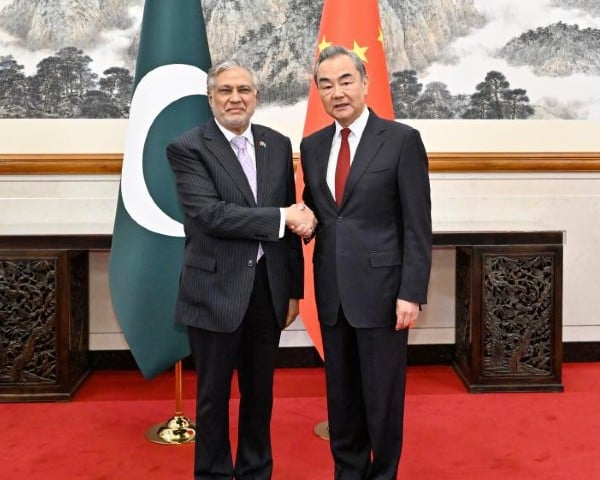KARACHI:
Pakistan and China agreed to play a positive and constructive role in helping Afghanistan achieve stable development and integration into the international community, said a joint statement released by the Ministry of Foreign Affairs.
The statement comes following the conclusion of Foreign Minister and Deputy Prime Minister Ishaq Dar’s visit to Beijing.
The two leaders co-chaired the Fifth Round of China-Pakistan Foreign Ministers’ Strategic Dialogue in Beijing, where both sides assured help and also sought the international community’s support for Afghanistan in helping it address challenges in areas of humanitarian situation and economic development, building an inclusive political framework, adopting moderate policies, pursuing good-neighbourliness and combating terrorism.
Pak-China officials engaged in discussions covering various aspects of their bilateral relationship, including strategic, economic, political, defence, and cultural cooperation.
The statement added that the officials also discussed international and regional issues of mutual interest, emphasizing the importance of safeguarding their common interests and promoting peace and development in the region.
Both countries reaffirmed their strong friendship and strategic trust, pledging to deepen their cooperation across all sectors and implement agreements made by their leaders.
They congratulated each other on recent achievements and reiterated their support for each other’s core interests, particularly concerning territorial integrity and combating terrorism.
Condemning the terrorist attack on the Chinese convoy of the Dasu Hydropower Project on March 26, the leaders pledged to enhance security measures and committed to fighting terrorism together, the statement noted.
It added that the leaders emphasized the importance of peace and stability in South Asia and expressed support for resolving disputes through peaceful means and multilateral cooperation.
Both sides pledged to deepen collaboration on China’s Belt and Road Initiative, aiming to enhance the China-Pakistan Economic Corridor (CPEC) with new corridors aligned to Pakistan’s development goals.
While showing commitment to expediting major infrastructure projects, and bolstering cooperation in various sectors like agriculture, industry, and technology in Pakistan, the leaders also recognized the significance of the Khunjerab Pass for bilateral trade and agreed to ensure its year-round functionality.
The meeting also discussed advancing energy cooperation and strengthening financial ties, with Pakistan acknowledging China’s assistance during natural disasters, said the MoFA statement.
Furthermore, the ministers celebrated their expanding cooperation in space exploration, emphasizing the importance of peace and stability in South Asia, they called for the peaceful resolution of all outstanding disputes, including the situation in Indian Illegally Occupied Jammu and Kashmir, based on international norms and agreements.
Days after China formally accepted a full-time Ambassador of Afghanistan under the Taliban regime, President Xi Jinping’s close aide travelled to Islamabad on February 2 to take Pakistan into confidence.
A statement issued by the Foreign Office said that both sides underscored their commitment to a peaceful and stable Afghanistan and emphasised the need for enhanced coordination for regional stability. “They also underlined the crucial role of neighbouring countries of Afghanistan for a peaceful, stable and prosperous region,” it added.
The sources said that China apparently took a “solo flight” in a disregard to the regional countries’ earlier understanding. They added that regional countries, particularly the immediate neighbours of Afghanistan, decided that the decision to recognise the Taliban government would be taken with consensus and collectively.
But, the sources continued, China’s close engagement with the Taliban government could enhance its leverage and might help Pakistan in the long run. China might have accepted a full-time Taliban ambassador but the sources said that its concerns regarding Afghanistan being used by terrorist outfits remained.
Pak, China agree to play positive, constructive role in Afghanistan









